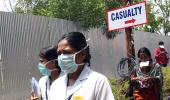Given the recurring outbreaks in the last five years, the government is considering domestic manufacturing of monoclonal antibodies for treating Nipah virus infections and is in talks with Serum Institute of India, report Shine Jacob and Sohini Das.

India may not immediately import an antibody from Australia to combat the Nipah virus as the affected patients in Kerala are out of danger.
However, the government and the Indian Council of Medical Research are in talks with the Serum Institute of India for local manufacturing.
Given the recurring outbreaks in the last five years, the government is considering domestic manufacturing of monoclonal antibodies -- that are used on compassionate grounds -- for treating Nipah virus infections.
Serum Institute of India, the world’s biggest vaccine maker, did not comment on the development.
Kerala health minister Veena George has expressed relief with no second wave being reported in the state so far and situation under control.
Moreover, 136 samples were tested negative so far and around 1,200 people are being closely monitored.
Kerala has so far confirmed six cases of Nipah infection since the latest outbreak in the Kozhikode district, which caused two deaths.
All the existing patients were said to be safe, including a child who was complaining of severe symptoms till Saturday (September 16).
On September 13, the state government sought the import of 50 doses of the antibodies.
Following this, the ICMR was planning to import at least 20 doses initially.
The drug, m102.4, was initially developed for treating Hendra virus, also a rare zoonotic disease, in Australia.
As in Nipah, fruit bats are considered to be the natural hosts for the Hendra virus as well.
The antibody is still referred to by a number and not a name, as clinical trials are yet to be completed and it is not an approved therapy for Nipah infections.
“The government may not opt for immediate imports, as it will be having the option to do so within 24 hours of an emergency,” said a source aware about the development.
This also takes into account the fact that the longest stability data for the antibody was 63 weeks and all of the 20 doses imported during the 2018 outbreak went to waste.
In 2018, the antibody — a non-patented drug developed by Christopher C Broder from Australia — was imported for compassionate use from the University of Queensland.
According to sources, talks are ongoing between the governments of India and Australia and also a consortium of manufacturing companies in that country.
Repeated Nipah outbreaks in Kerala -- in May 2018, June 2019, September 2021 and September 2023 -- are turning out to be a concern for the country.
As a result, the government is already in talks with SII to produce m102.4 domestically for possible emergencies.
The antibody was found to be effective in vitro (in cells or microorganisms placed in a test tube or culture dish).
According to experts, not importing the antibody may mean a loss of chance for the Indian government to conduct phase 1 trials.
“In 2018, we were trying to do a phase 1 trial also. However, the outbreak was over by May and we got the MAB on June 4. Hence, the trials did not happen. We even had a protocol in place for phase 1 trials,” said Raman Gangakhedkar, former head of epidemiology and communicable diseases, ICMR.
There is no effective treatment for Nipah infections.
The monoclonal antibody from Australia has been used on some individuals around the world.
There has been no large-scale clinical trial so far.
In a small phase 1 trial, the antibody was found to be safe. Therefore, experts felt the need for bigger trials before India could consider domestic manufacturing of the biological product.
The choice of different treatment options for the Nipah virus is necessitated by its high mortality rate -- around 40 to 75 per cent.










